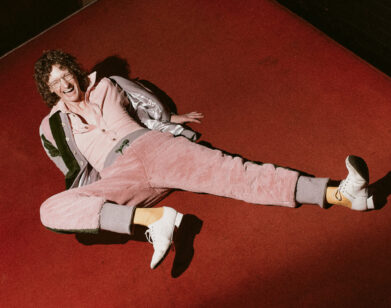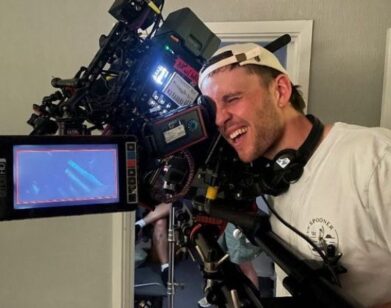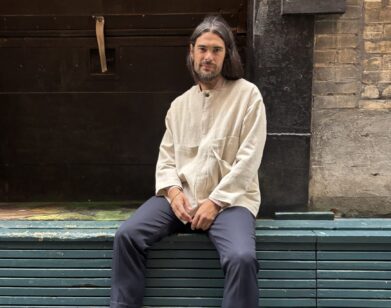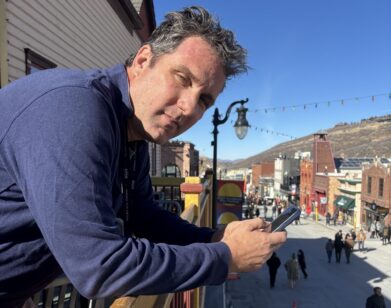“It’s Okay to Not Be Okay”: Shailene Woodley and Sebastian Stan Catch Up in Quarantine
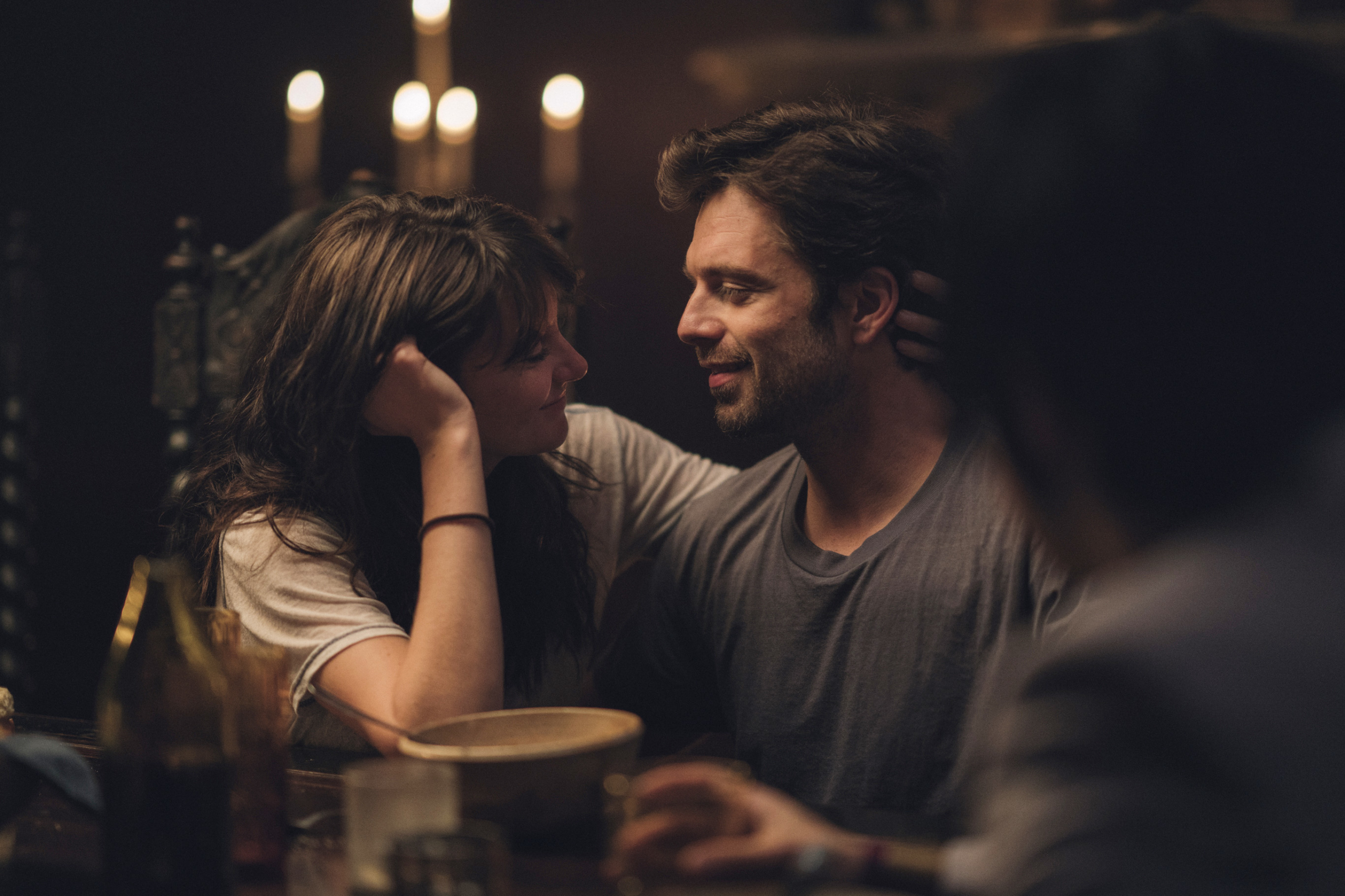
The first time we connected Shailene Woodley and Sebastian Stan over the phone, the idea was to get through the obligatory quarantine talk before segueing into a discussion of their new film, the romantic drama Endings, Beginnings. Thirty minutes, tops. Instead, the two actors coasted through nearly two hours of effortless chit-chat, with Stan in the role of interviewer, touching on their childhoods, the fine-print business of making movies, and what humanity might look like post-coronavirus. Then, thanks to a perfect storm of human error and technical difficulties, the call didn’t record. But instead of taking the loss, Woodley and Stan agreed to get on the phone a week later to do it all over again. And they did, as if they hadn’t spoken in months.
The pair first met in the Los Angeles apartment of Drake Doremus, who directed Endings, Beginnings, a stormy film about a woman (Woodley) caught between two best friends, played by Stan and Jamie Dornan. Doremus, known for making uncomfortably raw dramas with a technique that relies heavily on improvisation, encourages extreme vulnerability from his actors, which he did on that first day in his apartment. What could have been an awkward day of rehearsals, instead fast-tracked a real friendship. “We both have very similar dispositions and belief systems when it comes to connection,” Woodley told us. “So it wasn’t something that was forced, it was just very natural.” Woodley and Stan could clearly talk for hours, and they did.
———
SEBASTIAN STAN: How are you, Shailene?
SHAILENE WOODLEY: I can’t tell. Is it okay to sleep as much as I’m sleeping? Some days I feel wonderful and then other days I eat half a pint of ice cream and get confused. I’m really putting into practice the “it’s okay to not be okay” thing.
STAN: I’m with you. Every day I have no idea how I’ll feel when I go to sleep and whether I’ll wake up feeling motivated or feeling weirdly tired and sort of scared.
WOODLEY: On the mornings when you wake up and don’t feel motivated, what do you do?
STAN: I need routine. Every day, I try to do one productive thing, whether it’s reading a book or working on writing.
WOODLEY: You consider reading a book productive?
STAN: I do. As long as I’m not waking up and watching TV for four hours, I think that’s a win. I’m curious about you, because I know how busy you usually are. You’re always running around and doing a lot of different stuff, whether it’s projects or other causes that you support. This is probably what I’d be doing if I wasn’t working and everything was normal, anyway. But it’s weird when you’re not allowed to go outside.
WOODLEY: You feel like a 12-year old and your parents are telling you to do something you don’t want to do.
STAN: When’s the last time you hugged someone? It’s been seven weeks for me.
WOODLEY: It’s probably been about that for me, too. At least six weeks.
STAN: Do you think you’re going to hug people once this is taken care of?
WOODLEY: I’m going to hug people, I’m going to kiss people, I’m going to high five people. There’s no virus that can stop that. But touching clammy hands? There’s no way after this pandemic that I’m going to be down with that shit.
STAN: Do you take dance breaks during the day?
WOODLEY: I take handstand breaks, for sure. And I’m trying to do more dance breaks, because it makes me happy. I have this voice in my head that’s making excuses not do things, which is pretty new for me.
STAN: Are you enjoying being out in nature and is that peaceful for you?
WOODLEY: There’s an immediate recharge that happens. It makes such a difference for my psyche and my spirit.
STAN: I know how passionate you are about the environment. What triggered that?
WOODLEY: I don’t feel like I had a trigger. I just remember feeling like there was so much injustice toward this thing that we labeled a thing that was outside of ourselves, and yet was so inherently a part of us. As a young person, I recognized that the way that we treat one another, with distaste and division and anger and greed, is the same way that we treat our earth. And yet we refer to nature as something that’s outside of ourselves. It really came down to the simple fact that without earth thriving, humans don’t thrive. It’s never been about saving the earth for me, it’s about trying to preserve humanity. I believe the earth will be okay and that she’ll regenerate, and it might not look the same way that it does now, but it will survive whatever circumstances we throw at it. But we won’t.
STAN: Do you think we’ll come out of this thing a little more appreciative of the stuff we take for granted? I get worried that we’re just going to forget everything and go back to the way things were.
WOODLEY: The real test is how we’re using our time. If we’re not working on ourselves and addressing the things that cause us internal suffering, then I don’t think anything will change. It’s that idea of a ripple effect, where you throw a pebble and the ripples go out. If you aren’t first addressing that pebble, nothing around you will shift. I hope that what this pandemic brings is a greater sense of individual adoration and individual love and respect. It’s a hard thing to ask of people, because there’s so much that lies in the unknown. But if we really do take this time to look inward instead of focusing so much on the external, I think we have a fair shot at emerging from this situation with a new narrative.
STAN: That reminds me of the leadership program that your mom started, All It Takes. When you’re talking about this stuff, do you feel like you picked up a lot of it from your mom?
WOODLEY: It’s a compilation of things. I grew up with two psychologist parents and a grandmother who was a naturopath. Empathy was drilled into us as children. And for most of my 20s, I lived all over the world. Whenever I did a movie somewhere, I’d just stay afterwards and get to know that culture. Or if I wasn’t doing a film for a while, I’d move to a foreign country. You learn about that culture, but what you really learn is about where you’re from. It creates a mirror to how you grew up and what your society provides, and the things that are maybe negative. Having those perspectives, I think, really helped shape my own personal view of the world. Also, who wants to see someone suffering?
STAN: But we do it all the fucking time. Human beings are very good at making each other suffer.
WOODLEY: Because people are suffering themselves. I don’t believe anyone’s a bully just to be a bully. They’re being bullied themselves, whether it’s by their own internal voice or an external factor. There’s a difference between being a people-pleaser and wanting everyone to like you. For a lot of my life, I lived from that perspective, of wanting and gaining validation from how others perceive me. By nature, that makes you a kinder person, because you’re trying to win everyone over. That’s not necessarily a healthy habit. Now I live more from the place of, if I’m not exercising love and respect and pride and confidence to myself, there’s no way I’m going to be able to do anything for this planet, whether it’s the Earth or people around me. That’s one of my qualms with activism, and with the left and the progressive side. I’ll probably get in trouble for saying this, but we’re so quick to point fingers, and we’re so quick to deny responsibility and accountability, when in reality, we have to be accountable for every single choice, decision, and step we’ve made in our lives no matter what occurs around us. If we don’t work on ourselves first, nothing will actually change. With the progressive left, there’s a lot of ego involved, saying, “My way is the right way,” and every other way is wrong. And it’s just not true.
STAN: I feel like we’re also suffering from an over-saturation of information. There’s so much information constantly being thrown at you that you can’t keep track of things. You have to be very selective about where you’re getting it from. I think that’s causing anxiety. You said one key word, which is humility. That’s why failure is important. In the city, I hear the sirens every fucking hour and it breaks my heart every time, but as terrible as that is, we have to find a way to learn from this and be humbled by it. Hopefully we won’t take certain things for granted. You were saying earlier you traveled so much when you were a kid, and I traveled a lot, too. Do you think that contributed to you being an actor?
WOODLEY: I didn’t actually travel much as a kid. It was more in my 20s. My desire to be so nomadic came from being a curious bastard. I want to know everything there is to know about the human experience. I want to taste it all and smell it all and see it all. I’ve met so many people who never went to a normal public school, who traveled with their parents their entire childhood, and there’s something about that experience that has always intrigued me, more than the comfort of accumulation. Staying in one place, it’s really easy to accumulate and put material desires as your number-one priority. I wanted to rebut that. I wanted to get rid of everything I owned as a teenager. I wanted to travel with a carryon suitcase. I wanted to search for a level of depth that I couldn’t find in inanimate objects. Some actors watch a lot of movies and gain inspiration from other people’s performances. I didn’t grow up watching films and I have still seen very few. The way I gain inspiration is by witnessing the world around me. It’s by going to new places and seeing how different people use their hands to express themselves, maybe make different sounds with their mouths that we don’t make, or watching someone’s eyes when you’re on a train and you can tell they’ve had a rough morning. Those are all little psychological bits that I store in my head, so that when I’m building characters, I can pull from things that I’ve seen in real life.
STAN: When you decide to work on something, what are three things that are make-or-break?
WOODLEY: It wasn’t always like this, but now it’s very much actors, directors, and writers. Two of those three have to be 10 out of 10. And I’m so blessed to even be able to be in a position where I can say that.
STAN: I know we’re very blessed, but you worked hard. It’s okay to own that.
WOODLEY: If I’m reading a story and I have butterflies in my stomach, I’m in. If I don’t, I’m not. There have been a few times when incredible opportunities have come around and I have not had that gut reaction, and everyone around me has said, “You have to do this movie, because it’s this director or it’s this actor.” But I haven’t had that gut reaction so I passed.
STAN: Did you have butterflies when you read that you could work with Jamie Dornan?
WOODLEY: And that I got to work with Sebastian Stan? And Lindsay Sloane? Here’s the thing. I’ve seen half of Fifty Shades of Grey and I’ve seen I, Tonya, and that was the extent of my knowledge of you and Jamie as actors. So for me, it was exciting to get to work with these two people I was very unfamiliar with. It allowed me to get to know you guys for who you were, versus the idea of who I thought you were going to be as actors.
STAN: I know, I’m just teasing. You came in really late. I had a call with Drake [Doremus] and he said to me, “Hey, we’re going to try Shailene Woodley for the lead.” And I was like, “Oh my god, she’s incredible. Go for it.” A day or two later it was like, “Yes,” and then suddenly we were meeting at his apartment in L.A., and you and I were doing a staring contest while he was asking us personal questions about life, liberty, and the pursuit of happiness. Do you remember that?
WOODLEY: I’ll never forget it.
STAN: You were definitely better at staring than me.
WOODLEY: I get high off shit like that. I love connection and I love being put in uncomfortable situations. You and Jamie were just as daring in your vulnerability. It’s such a rare trait to find in people, even in actors. The whole point of being an actor is being vulnerable, but I can’t tell you how many actors’ eyes I’ve looked into and all I see is a performance. I don’t see them at all, which is sometimes devastating, because there’s nothing real to connect to. So the opportunity to connect that deeply and to just dive straight in, that was like candy for me. It was so yummy.
STAN: The whole improvisational aspect of it was about getting out of our comfort zones.
WOODLEY: Every day was an invitation to reveal something about yourself that you were hiding from.
STAN: That’s so intense.
WOODLEY: I try to relate it to other experiences in my life, even the greatest loves and friendships of my life. There’s a depth that you still don’t necessarily reach that we all reached together as strangers, because we took a blind leap of faith into the unknown. I remember saying things and feeling things and doing things that I would be more censored about in my real life. It was easier to be vulnerable and to throw caution to the wind, and that is Drake Doremus’s gift. He creates a container for us to be able to go to therapy for 21 days straight.
STAN: Is that what this was for you?
WOODLEY: I guess I mean therapy in the sense that I usually feel the most vulnerable when I’m in therapy. I needed therapy after the movie, to recover from the film. But during the movie, it felt like a playground. Everyone involved was so down to truly look into one another’s eyes and smell each other’s smells, and that makes or breaks a film. I don’t think a lot of actors are willing to do that, or have been told they’re allowed to do that.
STAN: What would you want people to take away from this movie?
WOODLEY: Oh, fuck. I don’t know. Wear a condom. [Laughter.] The greatest thing I could take away from this movie, as someone who’s watching it, is the sense that we’re conditioned to look for one person in our lives. We expect them to bring us joy and happiness, and it’s such a falsity. That will never happen. In this movie you witness that through this woman’s journey. I hope people take that and apply it to their own lives, whether they’re in a relationship or not. The most important relationship you can cultivate is with yourself. I crave the sincerity of presence that we had on our movie.
STAN: What does sincerity of presence look like on the set of Big Little Lies?
WOODLEY: Are you trying to set me up here? Working with Meryl [Streep] was absolutely fascinating, because she has somehow mastered the art of performance, of knowing every single tick about her character, while also marrying that with complete and utter presence, which is a skill I don’t have yet. Nicole [Kidman] is very similar. They know inside and out who their characters are. That must come from experience. When you work with people who are better than you, or who you admire, you show up differently to set. And I have to say, I just fucking love working with professionals. Whether you’re someone who’s been on one movie set or you’re Meryl Steep, that doesn’t matter to me. What matters is your sense of adoration and passion for the craft of acting. I get frustrated when I work with people who don’t seem to appreciate the gift that we’re given as actors to be able to express ourselves in this way. I just finished working with Jodie Foster and there is no one on this planet like her.
STAN: What was that like?
WOODLEY: That woman restored my faith in this industry simply by being who she is. She has paved her own way from the very beginning. You know so little about Jodie Foster’s personal life, about who she is as a human being, and yet you feel so connected to her in every movie she does because she gives it her all. She’s dissecting a film from every perspective. The lens of a director, the lens of a producer, the lens of an art director, the lens of a production designer, the lens of an actress. Meryl is the same way. It inspired me to work harder than I’ve ever worked before, and to also not give a fuck.

